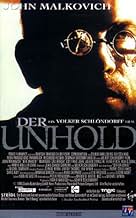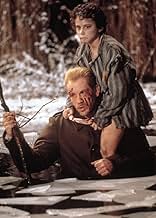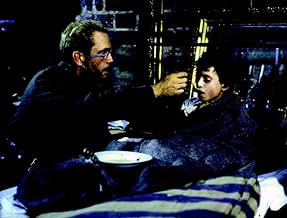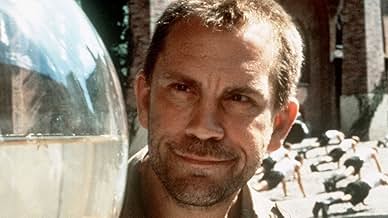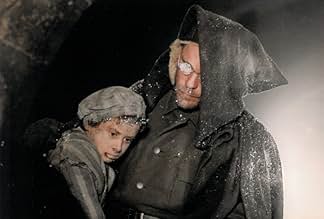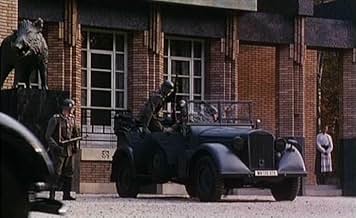Frenchman Abel Tiffauges likes children, and wants to protect them against the grown-ups. Falsely suspected as child molester, he's recruited as a soldier in the 2nd World War, but very soon... Read allFrenchman Abel Tiffauges likes children, and wants to protect them against the grown-ups. Falsely suspected as child molester, he's recruited as a soldier in the 2nd World War, but very soon he is taken prisoner of war. After shortly serving in Goerings hunting lodge, he becomes ... Read allFrenchman Abel Tiffauges likes children, and wants to protect them against the grown-ups. Falsely suspected as child molester, he's recruited as a soldier in the 2nd World War, but very soon he is taken prisoner of war. After shortly serving in Goerings hunting lodge, he becomes the dogsbody in Kaltenborn Castle, an elite training camp for German boys. Completely happ... Read all
- Director
- Writers
- Stars
- Awards
- 1 win & 1 nomination total
- Director
- Writers
- All cast & crew
- Production, box office & more at IMDbPro
Featured reviews
The film abounds in caricatures beginning with an outdoor picnic by complacent, indeed moronic, French officers who fail to even remotely perceive the danger of the onrushing Wehrmacht. Reichsmarshall Goring is portrayed as a grinning fool except when he approaches the state of barking madness. This is a legitimate dramatic device but the real Goring, cured before World War II of doctor-induced morphine addiction, was more complex and, in that sense, more interesting (decades ago I took a psychology course with Dr. Gilbert, who examined Goring at Nuremberg and wrote a book about the experience which is still available in second-hand bookshops. HIS Goring was chilling, no one to laugh at.).
The film is most effective when it eerily recreates what must have been the almost erotic attraction of nighttime rallies with flags, bunting, torches and the steady beat of martial music. That little boys were inculcated with the madness of Nazism through these rituals is powerfully shown here.
It was hard for me to care about Abel one way or the other but the character is well-acted as are the other main roles.
The movie is spanning a few years of time and the rhythm is slow, as one would expect from a film made from a book, and, while a little boring and depressing, it is a nice movie.
Bottom line: imagine Forrest Gump in Europe. No humour, no hope, no cares in the world. Oh, except the war. ;)
During Hitler's Putsch in 1923, Goring sustained a painful injury whose relief by means of morphine turned him into a drug addict nearly the rest of his life. This influence, in turn, made him "alternately elated or depressed; he was egocentric and bombastic, delighting in flamboyant clothes and uniforms, decorations, and exhibitionist jewelry." We see all these traits in Spengler's scenes, e.g. in his drunken alternation between a tirade and a blue funk at the fact that someone else had shot a stag that he wanted to shoot. When a soldier enters to bring him some really bad news, Goring is already so gloomy that he barely raises his hand from the table to salute, and his "Heil Hitler" is just a slurred grunt.
The article also establishes his corpulence and luxuriousness, to a point resented by his colleagues in the party. "His hunting interests enabled him to obtain a vast forest estate in the Schorfheide, north of Berlin, where from 1933 he developed a great baronial establishment" called Carinhall, full of artistic war booty, to which he retired whenever he could.
The film showed Goring as an often jovial man given, like Hitler, to occasional fits of imperious screaming. This behavior, according to one book I read recently, was to be expected of any top leader of the Third Reich not merely as a habit but as a deliberate technique. People outside of Germany were slow to take Hitler seriously as a threat because this conduct was so strange to them. They did not realize that German culture of the time regarded it as a standard part of the fatherly role. Therefore, as Hitler understood well, the more he screamed and shouted at his countrymen, the more closely they would identify him as a father figure and the embodiment of Der Vaterland.
Many superstitious beliefs have been associated with precious stones. The novel explains that Goring was not unique in imagining that plunging his fingers into a bowl of gems would drain away nervous energy and uncomfortable emotions. Other sources recount that when Hugo von Hofmannsthal's first poems appeared, under a pseudonym, they were so heavy with sensuous Weltschmerz that one critic declared they must have been written by an opulent old man while dipping his fingers in jewels. (He would soon be surprised that the poet was still a youth). So even this strange indulgence of Goring is in keeping with the ambient culture among those few who could afford the experience.
One could say much, much more about this complex film, but perhaps this elucidation of just one minor aspect suggests the multilayered care with which it has been put together.
This strange and original work is a French film about Nazi Germany done in English. There are no subtitles. Director Volker Schlondorff is German, the screenplay is by veteran French writer Jean-Claude-Carriere, who has scores of films to his credit including Bell de Jour (1967) and Valmont (1989), and the star is the American, John Malkovich, who plays a French simpleton named Abel Tiffauges who ends up as a servant in Field Marshall Herman Goering's hunting estate during World War II, and then later in a Hitler youth academy for boys.
Malkovich's Abel is enormously sympathetic because he has suffered but harbors no bitterness, because he genuinely loves children, and because he has a certain magic about him based on his childish belief that somehow he will survive any catastrophe. In a boy's home as a child he survives the brutality of a proto Goering-like fat boy, and then later as an auto mechanic he overcomes a false accusation of child molestation. Both of these little stories are vividly rendered and seem entirely realistic. Then begins Abel's war time adventures, and it is here that the story becomes, as some have observed, something of a fairy tale. Abel is able to leave his barracks at the prison to wander about where he meets a blind moose and then a German army officer at a deserted cabin in the woods. This leads to his being established at Goering's hunting estate, and from there to the Hitler youth academy where he is treated as a privileged servant. We see the Nazis as just another part of the bizarre personages of his world.
The depiction of Goering as a kind of self-indulgent Nero, living in opulence as the world burns, seemed entirely believable. The overall portrait of the Germans in an objective and balanced manner was refreshing and thought-provoking and one of the strengths of the film. The Nazi eugenicist is contrasted with the officer who was part of a failed plot against Hitler, both men enormously sincere and dedicated, the one unbalanced, the other unlucky.
This is not a film for those looking primarily to be entertained. This is a work of art, dark, uneven, and a bit curious.
Did you know
- TriviaGerard Depardieu was slated for the lead role
- GoofsPrior to the school fire, a caption says "Paris 1925". Upon his arrest as an adult, Abel, through his narration, remembers the fire as having happened "twenty years ago". This would place his adult scenes in 1945, but when he joins the French army after his arrest it is before the German occupation of Paris which would place his arrest in 1940. However, Abel is slow-witted and possibly does not have an accurate sense of time.
- Quotes
Count von Kaltenborn: This whole beautiful country, to which we have given our souls, is utterly doomed. It's going to be wiped out of human memory. Our entire heritage, even our name, our ancestors' names, wiped out, all wiped out!
- ConnectionsFeatured in Hollywood Profile: John Malkovich (1998)
- How long is The Ogre?Powered by Alexa
Details
- Release date
- Countries of origin
- Languages
- Also known as
- Ogre
- Filming locations
- Production companies
- See more company credits at IMDbPro
Box office
- Gross US & Canada
- $50,935
- Gross worldwide
- $50,935
- Runtime
- 1h 58m(118 min)
- Color
- Sound mix
- Aspect ratio
- 1.85 : 1

